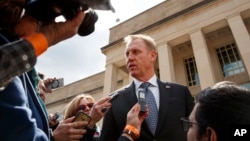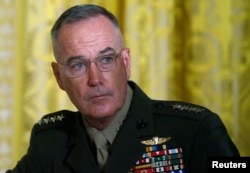VOA Pentagon correspondent Carla Babb contributed to this report.
Leading U.S. defense and security officials warn Iran was getting ready to unleash a wave of attacks across the Middle East targeting the United States and its allies when the decision was made to send more troops to the region.
Speaking separately, the acting secretary of defense and the country's top-ranking general Wednesday defended intelligence reports suggesting Tehran had planned to raise the stakes in the already volatile region.
'High confidence' in reports
"We get intelligence consistently that speaks to the threats in the region. This was an anomaly," acting Defense Secretary Pat Shanahan told reporters, while en route to Jakarta.
"I have very high confidence in the reporting," he added.
In Washington, Chairman of the Joint Chiefs of Staff Gen. Joseph Dunford likewise confirmed the intelligence that prompted the military to send reinforcements to the region was "qualitatively different."
"We saw something that looked more like a campaign," he said. "What is new was a pattern of threat streams that extended from Yemen, threats in the Gulf and threats in Iraq."
Dunford cited attacks on oil tankers off the coast of the United Arab Emirates, drone strikes and rocket attacks "in the proximity" of the U.S. Embassy in Baghdad as part of the Iranian campaign.
Also Wednesday, during a visit to Abu Dhabi to discuss security matters, White House national security adviser John Bolton said Iran was "almost certainly" responsible for the mine attacks off the UAE coast.
Iran Foreign Ministry spokesman Abbas Mousavi rejected Bolton's accusation as "ridiculous."
U.S. deployment
Earlier this month, the United States rushed the deployment of the USS Abraham Lincoln carrier strike group, including fighter jets, helicopters, naval destroyers and about 6,000 sailors, and deployed a bomber task force to the region in response to the increased threat.
Last week, defense officials announced they were sending 900 more troops to the region while extending the deployment of another 600 troops, part of a Patriot missile defense battery.
Tensions between Iran and the United States have escalated since President Donald Trump announced his decision to try to eliminate Iran's oil exports to pressure the Iranian government to alter its aggression in the Middle East.
In response, Iranian Foreign Minister Mohammad Javad Zarif accused top U.S. officials of "warmongering" and said the Trump administration's reimposition of sanctions against Iran amounted to "economic terrorism."
But Shanahan, who said Wednesday that the additional U.S. forces were being sent to Saudi Arabia and Qatar, rejected the Iranian accusations.
"Nobody wants a war," he said. "When the president says he doesn't want a war with Iran, I think that's pretty clear."
U.S. defense officials also said Tehran was told in advance that the U.S. moves were not designed to increase its offensive capabilities but merely to protect forces already in the region.
Open to talks
Iranian President Hassan Rouhani told a Cabinet meeting Wednesday that the "road is not closed" to negotiations with the United States if it returns to the 2015 international nuclear deal that Trump abrogated. The pact was aimed at curbing Tehran's nuclear weapons development while lifting economic sanctions on Tehran.
"The road is not closed for them, whenever they put aside their cruel sanctions and return to the negotiation table that they left," Rouhani said.






